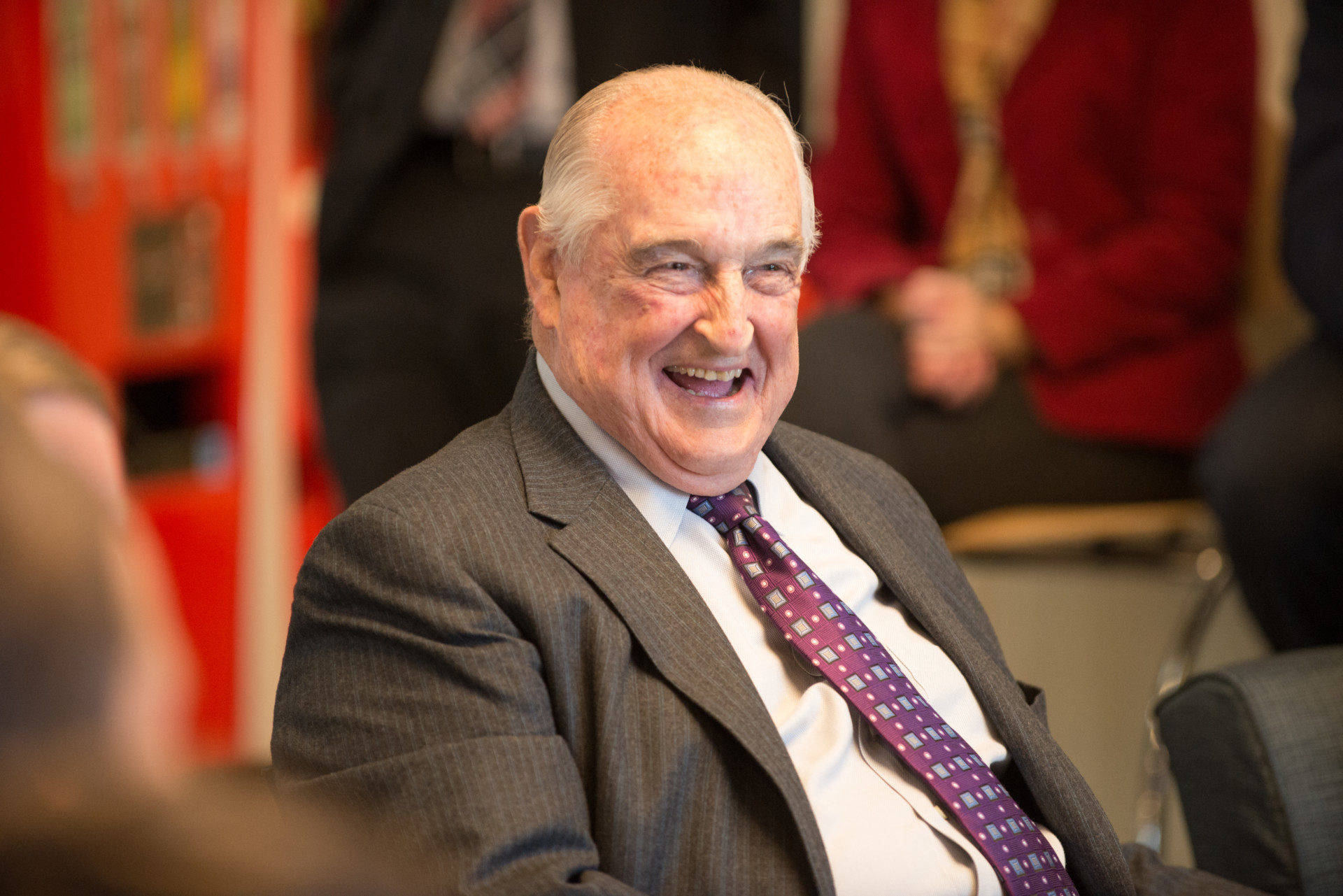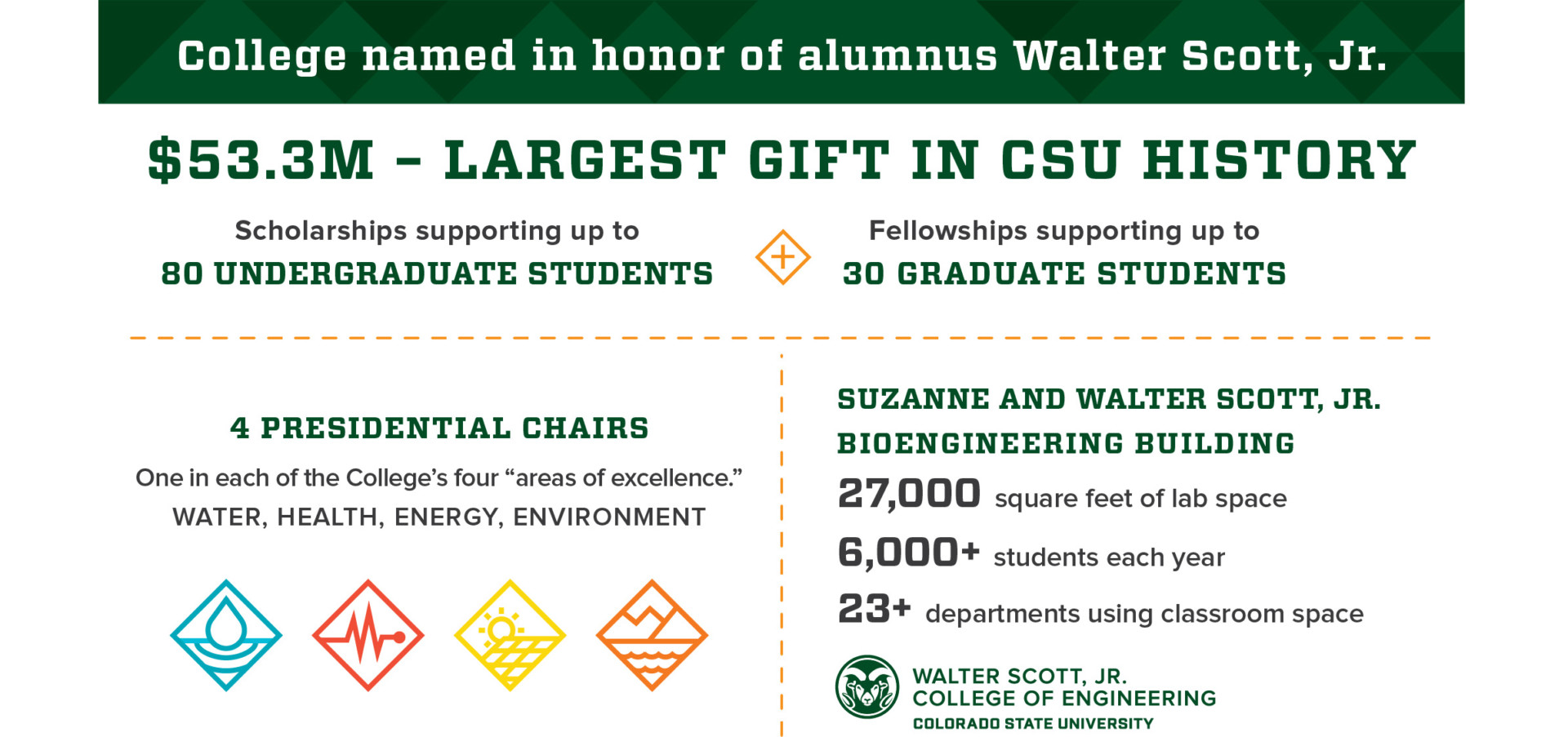
Commitment from 1953 alumnus Walter Scott, Jr. is largest in University’s history
By Tony Phifer
Published Nov. 15, 2016
Colorado State University announced today that it has received a $53.3 million gift, the largest in the University’s history, from business icon Walter Scott, Jr. of Omaha, Neb. The commitment will provide wide-reaching support for student scholarships, faculty excellence and research.
In recognition of this monumental gift, the College of Engineering will be renamed the Walter Scott, Jr. College of Engineering, becoming the only named college of engineering in Colorado. It is the second of CSU’s eight colleges to be named for a prominent alumnus. In 2005, the Warner College of Natural Resources was named for Edward M. Warner.
“We are humbled and incredibly grateful for this remarkable gift from Walter Scott,” said CSU President Tony Frank. “Walter has been a passionate and generous supporter of CSU since he graduated more than 60 years ago, and this gift is truly transformational. It will allow the Walter Scott, Jr. College of Engineering to attract and support the finest faculty and students for years to come. This truly is a great, great day in Colorado State University’s history.”

Scott graduated in 1953 from CSU, then known as Colorado A&M, with a bachelor’s degree in civil engineering, embarking on a long career with contracting giant Peter Kiewit Sons’, Inc. Scott’s long history of support to the University and its College of Engineering has significantly impacted student experiences, programs, research and infrastructure. With his late wife, Suzanne, he provided a leadership gift for the Suzanne and Walter Scott, Jr. Bioengineering Building, completed in 2015. It is home to more than 30 faculty and 120 graduate students conducting research on global challenges related to water, energy, health and the environment.
Scott’s passion for investing in young people shines through with this exceptionally generous gift. By significantly expanding a previous gift that established the Walter Scott, Jr. Scholarship Program, it will provide renewable merit scholarships for up to 80 undergraduates, and fellowships for up to 30 graduate students, with outstanding academic qualifications.
“As we get older, I think it’s natural to think about the generations that will follow,” said Scott. “And in a technological age, it’s important that our top students have the opportunity to study at strong research universities.”
Scott also noted the connection between the University and the company he once led. Kiewit, which has its Colorado offices in Englewood, employs more than 100 CSU alumni.
“CSU has long been near the top in the number of students the company hires each year,” Scott said. “Helping young people with their education is one of the finest investments we can possibly make as a society, and I’m always pleased to see so many of the University’s students choose to start their careers at Kiewit.”
An additional part of the gift is designed to attract world-class faculty through the creation of four Presidential Chairs in water, health, energy and environment – the College’s four “areas of excellence” – and will provide the infrastructure and labs to drive teaching and research excellence. Scott’s gift also affords discretionary funds to be invested in strategic initiatives and creation of leadership programs supporting innovation and excellence across the college.
“This amazing gift from Walter Scott will transform the College of Engineering and equip our faculty and students to achieve new and greater impact on our world,” said Dean David McLean. “This gift truly allows us to focus on excellence and being one of the best engineering programs in the country. We will be able to attract top students and faculty from around the world, and give them the opportunity to work in a premier facility that Walter and Suzanne helped us build. It will add to our already remarkable legacy of excellence in the college.”
“As we get older, I think it’s natural to think about the generations that will follow. And in a technological age, it’s important that our top students have the opportunity to study at strong research universities.” – Walter Scott, Jr.
Rise to the top
Scott chose CSU because a family friend was enrolled and because of its Range Management program. He worked on an Oregon ranch during high school summers and had planned on a career in ranching. The friend successfully counseled Scott to instead study civil engineering.
Scott’s father had worked for Kiewit since 1926 and was the company’s chief engineer. During college summers, Scott worked on the massive Garrison Dam project Kiewit was building on the Missouri River in North Dakota. Prior to his senior year, he married high school sweetheart and fellow 1953 CSU alumnus, Carolyn Falk, who graduated with a degree in English.
Scott’s first Kiewit assignment after graduation was on the Civic Auditorium project in Omaha. He enlisted in the U.S. Air Force in 1954, entering as a second lieutenant due to participation in the ROTC program at CSU. He rejoined Kiewit in 1956, with early assignments in California, New York and Ohio before being transferred to Omaha headquarters in late 1963.
Walter Scott gets ready to fire the cannon before the CSU football game vs. the University of Northern Colorado at Sonny Lubick Field, Hughes Stadium, Sept. 17, 2016.
In Omaha, Scott had executive oversight responsibilities for company operations east of the Mississippi. In the mid-’60s, he began a dramatic expansion of Kiewit’s work in the eastern provinces of Canada. He was named president in September 1979 and, when Peter Kiewit died two months later, was selected to succeed him as chairman of the board.
Scott led Kiewit to new ventures beyond the company’s historical roots in construction and mining, with a focus on energy and telecommunications. Energy operations were spun off in late 1997 and are now Berkshire Hathaway Energy of Des Moines, Iowa. The telecommunications operations were spun off in 1998 and are now Level 3 Communications of Broomfield, Colo.
Scott retired as a director of Level 3 Communications in 2014. He continues to serve on the boards of Peter Kiewit Sons’, Inc., Berkshire Hathaway, Berkshire Hathaway Energy and Valmont Industries.
A life of philanthropy
Scott’s reputation is that of Omaha’s foremost philanthropist, lending his leadership as well as resources to important civic initiatives. Serving as chairman of the Omaha Zoological Society since 1982, he has been instrumental in transforming Omaha’s Henry Doorly Zoo & Aquarium into one of the finest in the world.
Earning his Eagle Scout badge at the age of 14, Scott has been generous to the Boy Scouts on the local and national levels. Other key interests have been youth social services, higher education, medical research and museums. Through the years, he has served on numerous charitable boards.
Scott’s four children with Carolyn are Karen, Sandy, Amy and David. Carolyn died in 1983. When he remarried in 1987, Suzanne brought two children to the family, Dr. William Singer and Dr. Robert Singer. Suzanne died in late 2013.
Beloved by his alma mater
Scott has often spoken about how his CSU education helped guide his career. He has received numerous awards from his alma mater, including College of Engineering Honor Alumnus in 1982, an honorary doctorate in 2003, and the William E. Morgan Alumni Achievement Award in 2014.
“Walter Scott has been a tremendous partner for CSU over the years – ensuring students have scholarships, and the best faculty, support and facilities available, to succeed,” said Brett Anderson, vice president for University Advancement. “Having the College of Engineering named after such a well-respected and notable alumnus raises its prominence and shines a spotlight on this incredible college and Colorado State University. We cannot thank Walter enough for his trust, commitment, and investment in our future.”
The University will celebrate this gift with Scott at a campus event in April.